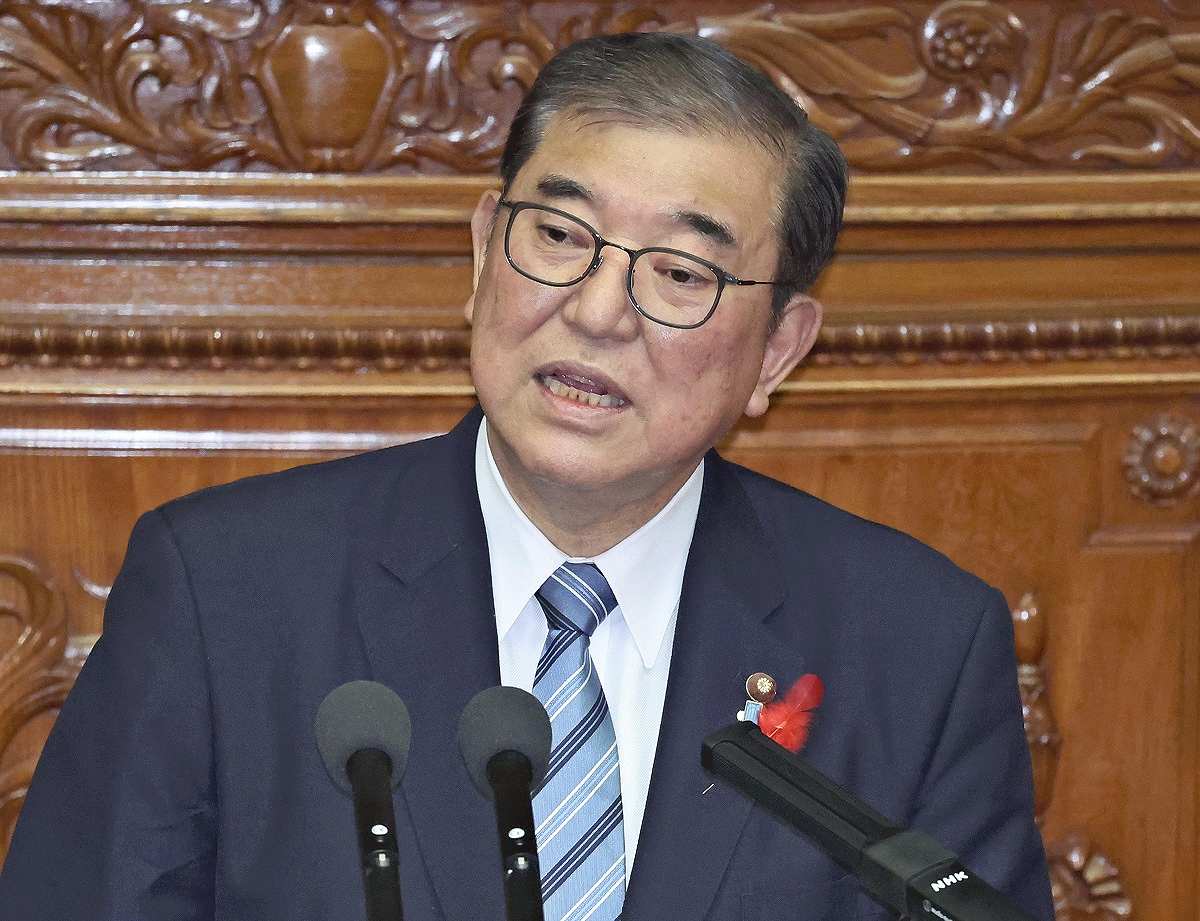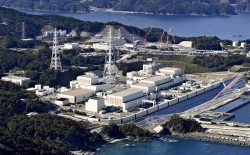Japan PM Ishiba Vows to Create Disaster Management Agency, Strengthen Regional Economies in 1st Policy Speech

Prime Minister Shigeru Ishiba delivers a policy speech at a plenary session of the House of Representatives in the Diet on Friday.
17:58 JST, October 4, 2024
Prime Minister Shigeru Ishiba said Friday he would create a disaster management agency and boost regional revitalization, in his first policy speech since his Cabinet was inaugurated.
Calling for “security and safety for all,” Ishiba stressed the need to further boost measures for regional development and establish a disaster management agency to enhance disaster preparedness, at plenary sessions of both houses of the Diet on Friday afternoon. He also set a goal of raising the average minimum wage nationwide to ¥1,500.
The new prime minister outlined five principles for “creating a future for Japan and protecting its future.” The five are upholding the rules, defending Japan, protecting the country’s people, supporting regional areas and ensuring opportunities for youth and women.
At the beginning of the speech, Ishiba addressed the violations of the Political Funds Control Law by Liberal Democratic Party factions and expressed his “deep regret.”
“I will again face each and every lawmaker who has been indicated to be involved [in the scandal] and do my utmost to establish a sense of ethics that upholds the rules,” he said. “I will fulfill my own responsibilities to explain [the situation] and do my best to further increase transparency.”
Having served as the first minister for regional revitalization, Ishiba believes “regional areas are the main drivers of growth” and stressed that he would bring out the full potential of regional areas through cooperation among “industries, government bodies, academic institutions, financial organizations, workers and the media.”
To help accelerate efforts in regions across the nation, Ishiba said he aims to double the amount of subsidies for regional revitalization on an initial-budget basis. He also said he would establish “a headquarters for the creation of new regional economies and living environments” and formulate a basic strategy to be tackled intensively over the next 10 years.
Describing Japan as “one of the world’s most disaster-prone countries,” Ishiba said he will drastically strengthen the functions of the Cabinet Office for handling disaster management, both in terms of budget and personnel.
“I will proceed with preparations to establish a disaster management agency led by a dedicated minister,” he said.
After noting the harsh conditions faced by disaster victims living at evacuation centers, Ishiba also announced there would be a review of how evacuation centers should be set up and operated.
Regarding economic measures, he said that to realize wage increases that exceed inflation, productivity and added value would have to be increased. He set a goal of raising the average minimum wage nationwide to ¥1,500 before 2030.
In diplomacy and security, the prime minister did not mention the creation of an Asian version of NATO or revisions to the Japan-U.S. Status of Forces Agreement — ideas both advocated by Ishiba — but instead, he said he will work to further strengthen cooperation with friendly nations and like-minded countries, with the Japan-U.S. alliance as a cornerstone.
Describing Self-Defense Forces personnel as the foundation of Japan’s defense capabilities, Ishiba announced a plan to establish a ministerial council headed by the prime minister to work toward improving the living and working conditions and treatment of SDF members.
Related Tags
Top Articles in Politics
-

Japan PM Takaichi’s Cabinet Resigns en Masse
-

Sanae Takaichi Elected 105th Prime Minister of Japan; Keeps All Cabinet Appointees from Previous Term
-

Japan’s Govt to Submit Road Map for Growth Strategy in March, PM Takaichi to Announce in Upcoming Policy Speech
-

LDP Wins Historic Landslide Victory
-

LDP Wins Landslide Victory, Secures Single-party Majority; Ruling Coalition with JIP Poised to Secure Over 300 seats (UPDATE 1)
JN ACCESS RANKING
-

Japan PM Takaichi’s Cabinet Resigns en Masse
-

Japan Institute to Use Domestic Commercial Optical Lattice Clock to Set Japan Standard Time
-

Israeli Ambassador to Japan Speaks about Japan’s Role in the Reconstruction of Gaza
-

Man Infected with Measles Reportedly Dined at Restaurant in Tokyo Station
-

Man Infected with Measles May Have Come in Contact with Many People in Tokyo, Went to Store, Restaurant Around When Symptoms Emerged


















